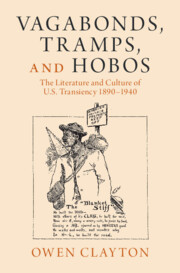Book contents
- Vagabonds, Tramps, and Hobos
- Cambridge Studies in American Literature and Culture
- Vagabonds, Tramps, and Hobos
- Copyright page
- Dedication
- Contents
- Figures
- Acknowledgements
- Part I Context
- Part II The Vagabond and the Tramp
- Part III The Hobo Transformed
- 5 Between Hobohemia and Academia: Nels Anderson’s Double Voice
- 6 ‘The Laureate of the Logging Camps’: Language, Food and Revolution in the Work of T-Bone Slim
- 7 ‘I’m a Hobo Myself Sometimes’: African-American Transiency in Black Vernacular Music
- Conclusion: The End of the Road? Transiency beyond the Hobo
- Notes
- Bibliography
- Index
- Recent books in this series (continued from page ii)
7 - ‘I’m a Hobo Myself Sometimes’: African-American Transiency in Black Vernacular Music
from Part III - The Hobo Transformed
Published online by Cambridge University Press: 27 July 2023
- Vagabonds, Tramps, and Hobos
- Cambridge Studies in American Literature and Culture
- Vagabonds, Tramps, and Hobos
- Copyright page
- Dedication
- Contents
- Figures
- Acknowledgements
- Part I Context
- Part II The Vagabond and the Tramp
- Part III The Hobo Transformed
- 5 Between Hobohemia and Academia: Nels Anderson’s Double Voice
- 6 ‘The Laureate of the Logging Camps’: Language, Food and Revolution in the Work of T-Bone Slim
- 7 ‘I’m a Hobo Myself Sometimes’: African-American Transiency in Black Vernacular Music
- Conclusion: The End of the Road? Transiency beyond the Hobo
- Notes
- Bibliography
- Index
- Recent books in this series (continued from page ii)
Summary
Chapter Seven focuses on African-American representations of transiency. Black transients suffered from the same problems of poverty and hunger as whites but they had to contend with the added problems of racial discrimination and state-sanctioned violence. They were also, to varying degrees, barred from hobohemian subculture. Black transients were entirely excluded, for example, from the publishing market for book-length hobo memoirs. This chapter seeks out representations of transiency in black vernacular music, particularly, though not exclusively, the blues. I argue that examining the lyrical content of black vernacular music changes the cultural representation of the hobo because blues is more sexually explicit, contains more examples of female empowerment, and places a stronger emphasis on the road as a place of violence than do white written accounts. The romanticisation of the road that is common in white hobo memoirs is largely absent from black vernacular music, in which concerns about needing to leave town, often to escape an awkward romantic situation but sometimes to escape from the violence of the railroad police, loom large.
Keywords
- Type
- Chapter
- Information
- Vagabonds, Tramps, and HobosThe Literature and Culture of U.S. Transiency 1890–1940, pp. 200 - 229Publisher: Cambridge University PressPrint publication year: 2023



